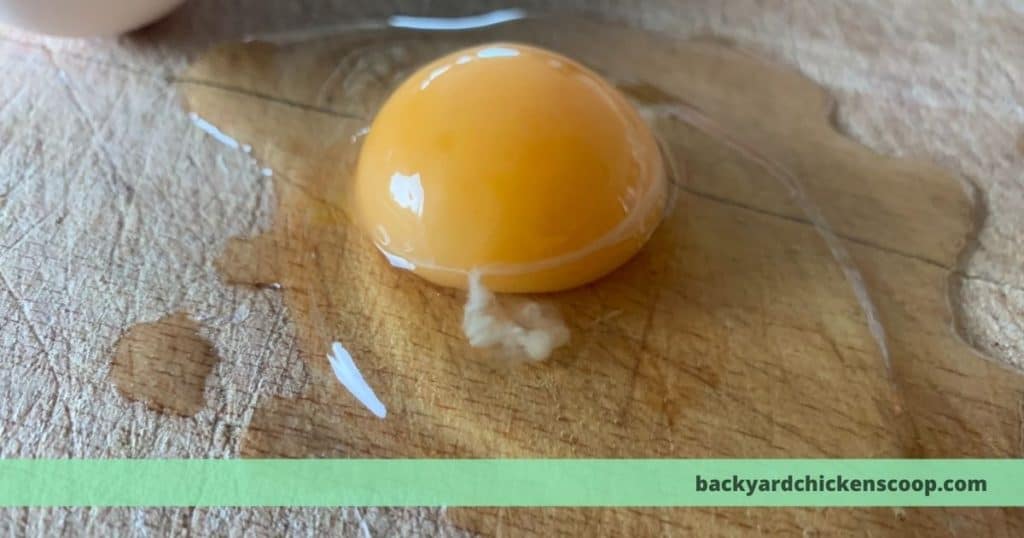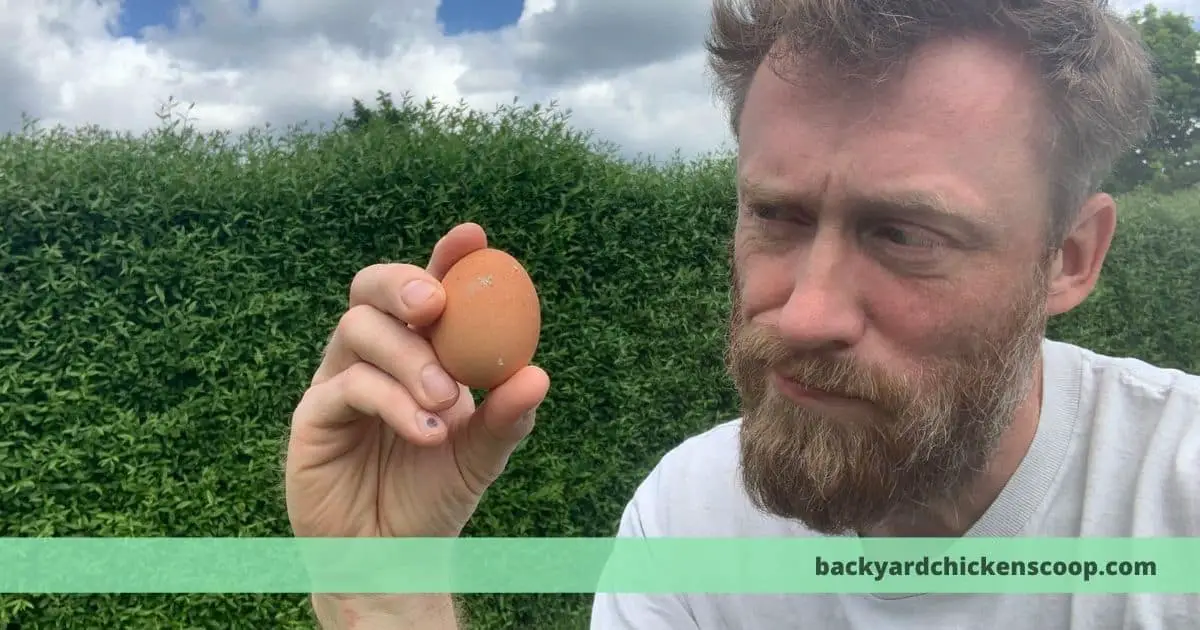Owning chickens can be a wonderful experience, but just as with any animal, they can also come with surprises. When you’re not sure what’s going on, some of these surprises can seem worrisome – particularly when there is blood involved.
If you’ve found blood on an egg your hen has laid and are wondering what could be the cause – and more importantly if you should be concerned – read on to learn some of the most common questions regarding bloody eggs, what to do with bloody eggs, and how to know when it’s time to call a vet.
So, why are your chickens laying bloody eggs?
A spot of blood connected to the yolk means bleeding had occurred inside of the ovary when the egg was separated from the follicle. It does not mean it’s been fertilized, or that it’s unsafe to eat. Blood spots on the outside of the egg are from a ruptured blood vessel in either her oviduct or vent muscles.

What does a bloody egg mean?
While it might seem alarming to see blood spots on the egg your hen laid (or some spots in her nest), it does happen from time to time. Blood spots occur naturally during the laying cycle and are usually the result of a tiny, ruptured blood vessel in either her ovaries or oviduct (which is the tube that the eggs pass through).
Larger eggs can cause this to happen, and this can also occur when your hen is just beginning to lay eggs because her vent muscles are not yet accustomed to this process.
If she has any open sores or visible blood, separate her from the others because chickens, for whatever reason, like to mercilessly peck at bloody areas which can result in injury or death, so keep her apart from them until she’s healed.
What do you do if your hen has a prolapse?
Wash the area with warm, antiseptic-infused water. Cover her head and tuck her under your arm and then – with clean hands – gently push the prolapse back into her vent cavity (you can apply haemorrhoid cream to help shrink it which will make this easier to do).
Allow her to recover in a box or darkened room (this allows the prolapse time to settle back inside of her body). Don’t allow her to lay for a while and do not feed her for 24 hours (but make sure to give her water) and then gradually feed her a bland diet (Weetabix).
You can help to restore her calcium by adding electrolytes and vitamins to her water.
Another diagnosis you need to consider is vent gleet, which can read more about in my post here…
What if your hen is egg bound?
If you notice that your hen is looking hunched, fluffed up and miserable, she may be egg bound (meaning that the egg is stuck inside of her and she is struggling to pass it). She might also be panting, breathing quickly, and/or straining.
You can help her by sitting her in a bowl of warm water or blowing at her vent with warm air from a hair dryer (make sure it’s not hot though otherwise, it might burn her).
You can also use olive oil or Vaseline to help her by rubbing it on her vent and this will relax her muscles, allowing her to pass the egg.
What if you see an egg stuck in her vent?
Sometimes, a hen will be unable to pass the egg on her own. In this case, you will need to remove it carefully to ensure that it doesn’t break. If it does happen to break, make sure to carefully remove the pieces to avoid an abdominal infection.
What does it mean when you crack an egg and it’s red?
Don’t worry, seeing the red inside of an egg you’ve just cracked open does not mean that the egg has been fertilized, or that it’s unsafe to eat.
A spot of blood connected to the yolk usually means that the bleeding occurred inside of the ovary when the egg separated from the follicle (which is the sac containing blood vessels and fluid).
Is a bloody egg OK to eat?
As stated above, blood inside of eggs does not render them inedible and they are safe to eat as long as you’ve properly cooked them. Just like blood on the outside shell of an egg can occur from time to time, so too can this occur inside and is no cause for concern.
If the idea of blood makes you feel queasy, you can scrape the bloody part out as you cook your egg, but there’s no need to worry if you choose not to.
When should you contact a vet?
It’s important to contact your veterinarian if you notice that:
- Your hen is bleeding often
- There is a lot of blood
- You notice blood on her vent
- You also notice blood in her mucus or droppings as this could be an indication of coccidiosis
I’ve written a complete guide to coccidiosis. If you’re concerned you should check it out here…
In summary, finding a little bit of blood on the outside (or inside) of your hen’s eggs every once in a while is not usually cause for concern because it’s rather common for hens to bleed a little bit sometimes when laying.
Just keep an eye on her, keep her clean, and help her out if she needs it. Don’t stress yourself out – just pay attention and give her a little love and everything will be okay.
Sources
The Omlet: https://support.omlet.com/index.php?/Knowledgebase/Article/View/3/0/bleeding-from-the-vent-area
My Pet Chicken: https://www.mypetchicken.com/backyard-chickens/chicken-help/Should-I-be-concerned-that-my-hen-laid-an-egg-H149.aspx
Healthline: https://www.healthline.com/nutrition/bloody-egg
The Chicken Health Handbook: https://the-chicken-chick.com/prolapse-vent-causes-treatment-graphic/
Freedom Ranger Hatchery: https://www.freedomrangerhatchery.com/blog/coccidiosis-your-chickens-what-you-need-to-know/


